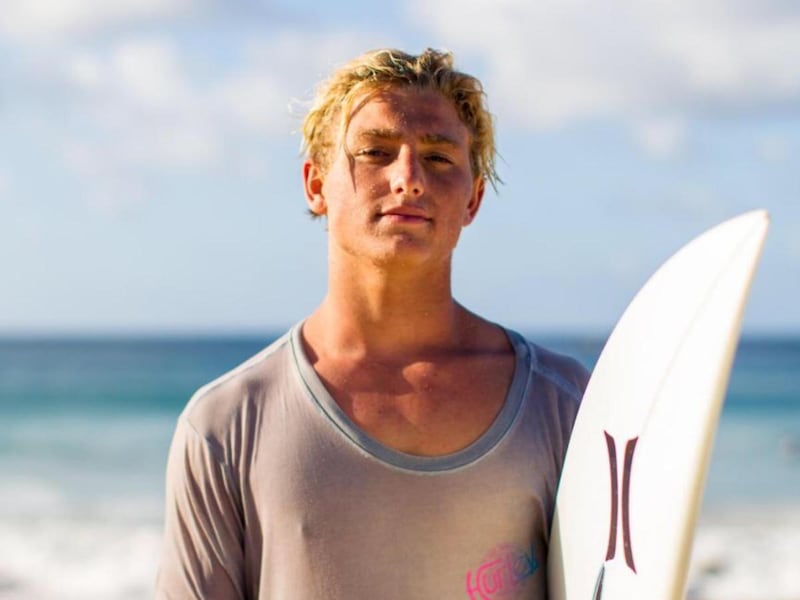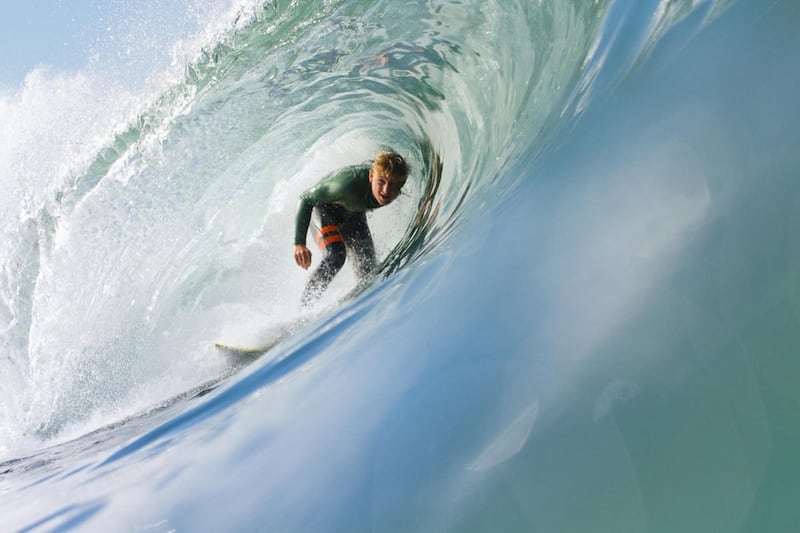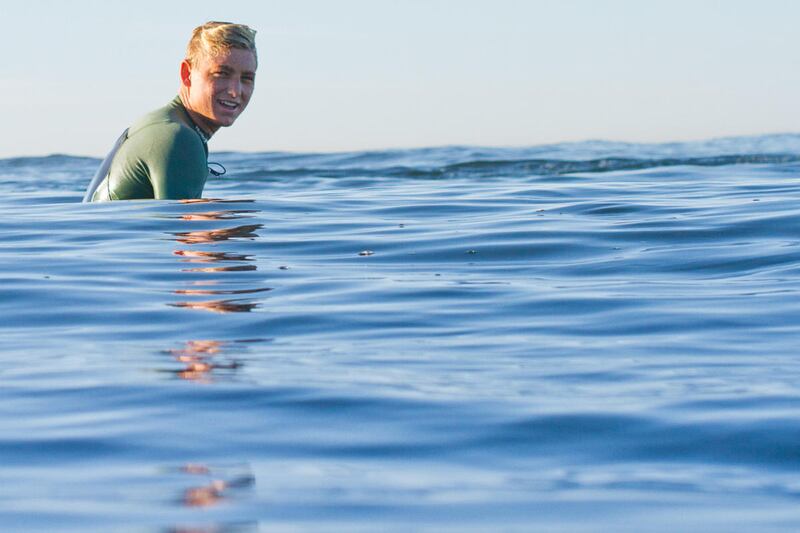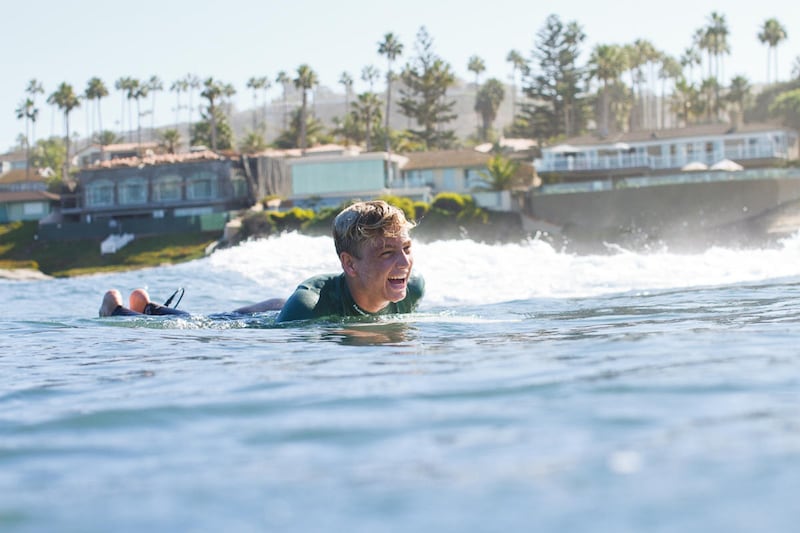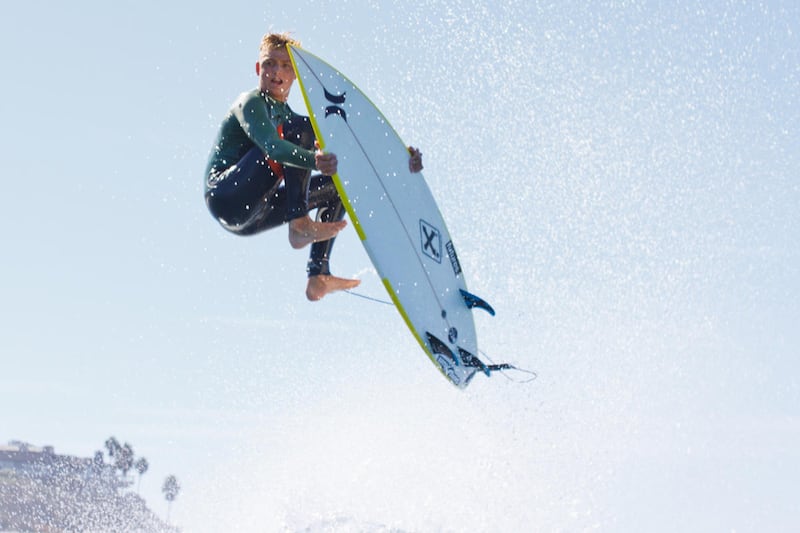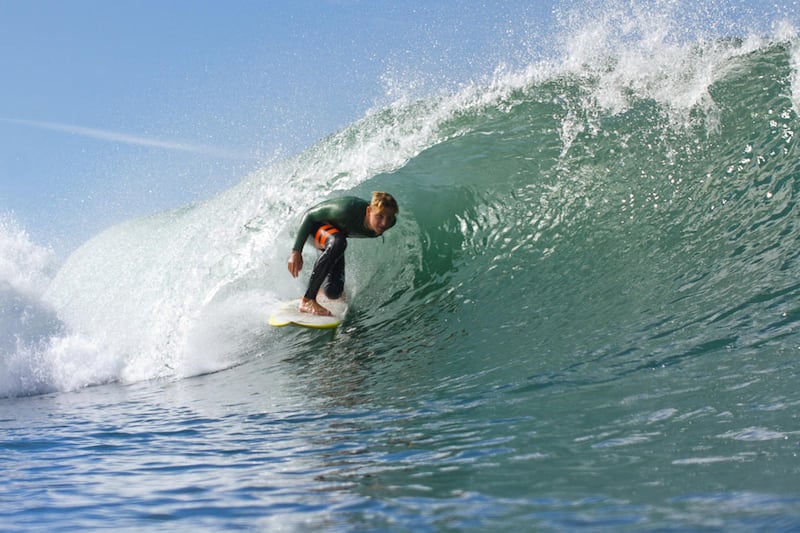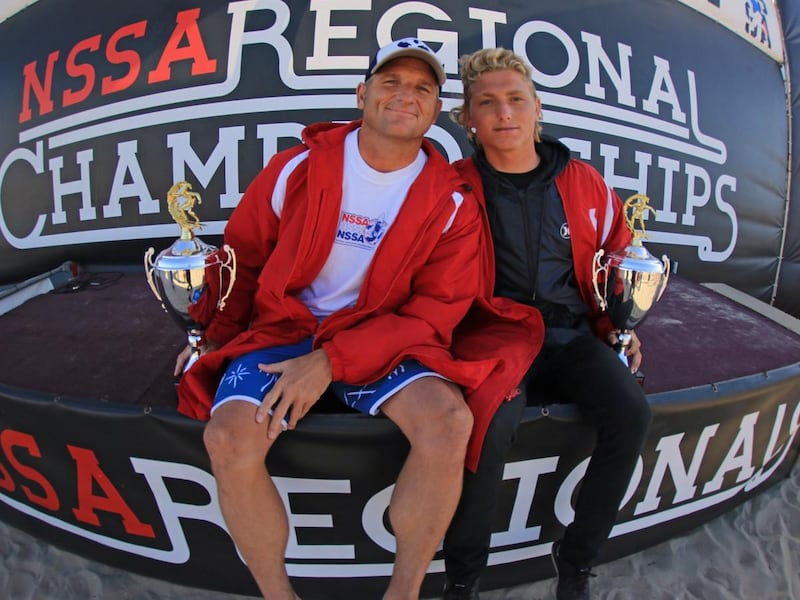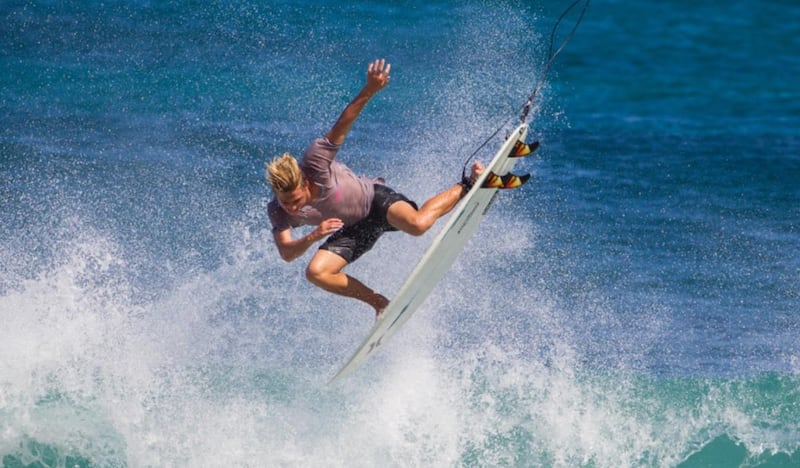I usually don’t surf on Sunday, so I get questions. You explain and then they say, oh, OK, that’s cool. – Jordy Collins
Hey, kids, aren’t you glad you aren’t 17-year-old Jordy Collins? He surfs three-four times a day — “I try to surf every day,” he says — but he does get Sundays off. Poor kid. He surfs because it’s basically his job. The working conditions are brutal — all that sun and water, you know. How does he stand it?
He has to endure a commute every day. From his home in Carlsbad, California, he has to walk two entire blocks to get to the beach — that is, when he isn’t traveling to competitions in Hawaii, Brazil, Mexico, Barbados, Florida, Virginia, North Carolina. … Each year he moves to Hawaii for a few weeks to train. It’s a tough life, but someone has to do it. What about school, you’re wondering? He home-schools so he can surf full time.
You could get used to being Jordy Collins.
His life sounds like one Endless Summer (cue the Beach Boys music), but this is serious business for him. He is one of the rising young competitive surfers in the country. He competes on the Qualifying Series tour, which is to the World Surf League what Triple A baseball is to the Major Leagues. He’s trying to earn his way into the big leagues.
Last year he was one of 10 surfers — and the lone American — selected from around the world to compete on a Brazilian island for the title of King of the Groms (in surfer parlance, a young surfer). Sponsored by Quiksilver, it’s part surf competition, part photo session. In the end, Collins was named the winner.
At this year’s National Scholastic Surfing Association regional championships, which is the culmination of 10 qualifying competitions on the West Coast, he won the junior (19 and under) championship and was third in the open men’s competition. The winner of the super senior division was none other than Collins’ father, Daren, marking the first time anyone could ever remember a father and son winning trophies.
In the Surfing America series, which uses a grand-prix type scoring system based on the results of six competitions, Collins won the overall 2016 series championship.
At the Volcom’s global championships in June, which brings together the winners of regional competitions from around the world, he placed fourth in the junior competition.
Ultimately, Collins hopes to qualify for the World Surfing League and make a career of surfing. “It’s kind of like, if you don’t get there by around 22, the odds get worse for you,” he explains. With the addition of surfing to the 2020 Summer Olympic Games, Collins has Olympic aspirations, as well.
Collins learned surfing literally at the feet of his father, riding on the end of Daren’s board as a 2-year-old. Daren took up surfing while growing up in San Diego. The only break he took from the sport was when he attended BYU and when he served a Mormon Church mission in Denmark. After graduating from BYU in 1992, he returned to California and surfing. He and his wife Tammy have four children, the others being Justin, a returned missionary who attends BYU, Joshua, who is serving a mission in the Czech Republic, and Jill, who lives at home. All of them grew up on a surfboard.
“The family that surfs together stays together,” says Daren, a sales executive who still surfs several times a week and competes in local surf events. At 51, he is 20 pounds lighter than his college days.
Says Jordy, “As long as I can remember my dad would take me out surfing.”
By 4, he was boogie boarding and surfing in the white water close to shore. At 7, he began paddling out alone to catch the waves. He started competing in local surf events at 9 and then two years later began competing in regional events up and down the coast. In his father’s words, “He was good, but not great. Really it was last year that he turned it up a notch.”
“Obviously, I want to compete with the best on the world tour,” says Jordy. “I want to see how far that goes. But then I could see myself going the big-wave route, too. I’ve always been interested in that.”
Big-wave surfing is a sport within the sport. It consists of riding waves that top 20 feet and are as big as 70 feet, if not higher. A couple of years ago the WSL sanctioned a big-wave world tour. Big-wave surfers are on-call 24/7 to fly off to any of more than 30 big-wave hot spots around the world.
“You’ve got to be ready at the drop of the hat when the call comes,” says Jordy, who has surfed waves in the 25- to 30-foot range.
Jordy Collins proved to be fearless at a young age. During a trip to Oahu’s famed North Shore at the age of 14, he and his father were checking out the surf conditions when Daren expressed his reservations about sending his son out into such big waves. He suggested they try another beach where the waves might be smaller. After some deliberation, Jordy told his father, “Dad, “I’m going out.” He paddled out into the waves and, as his father recalls, “He gets a couple of waves and then a big set came in and broke right in front of him. I was really concerned. I saw his board come up, broken in half, sticking out of the water. Then finally I saw him surface. He took a good beating.”
Undaunted, Collins aspires to a surfing career, which includes everything from daily practice on the waves to creating a social media presence. Sponsors, a necessity for survival in the sport, are looking for marketability in surfers. Collins has his own website — Jordycollins.com — and he’s been posting photos on Instagram for years. His name sponsor is Hurley, the clothing company.
“Nowadays,” he says, “it doesn’t matter how good you are or how good of a person you are; sponsors look for how marketable you are.”
At first glance, an active Mormon in the surfing world might seem like a clash of cultures, but surfing has evolved. As Daren puts it, “When I was growing up it was more of a culture of rebellion against society and parents and all that. But it’s become a competitive sport and people approached it differently. It’s really changed. It’s a family atmosphere.”
Says Jordy, “There are a lot of kids in the pros now who realize how serious our sport is becoming, so it’s not too hard to say, ‘no, I don’t do that.’ It’s about becoming athletes. Kelly Slater (a legendary surfing champion) was the first to step back and say we’re actual professional athletes. So it’s not too hard, although it’s definitely not the normal thing. I usually don’t surf on Sunday, so I get questions. You explain and then they say, oh, OK, that’s cool.”
As for flying off to spend weeks with other surfers who party hard and live another lifestyle, he says, “My parents trust me. They know what I’m about. They know that I’m strong in the gospel and that I have values.”
He believes his values have given him perspective and helped him deal with the pressure of the sport. “Kids take this super seriously, and if they lose it ruins their month,” he says. “It’s the only thing they have. I used to be the same way. Now I don’t let it control my life. There are always going to be other contests. It’s helped me a lot.”
Doug Robinson's columns run on Tuesdays and Wednesdays. Email: drob@deseretnews.com


